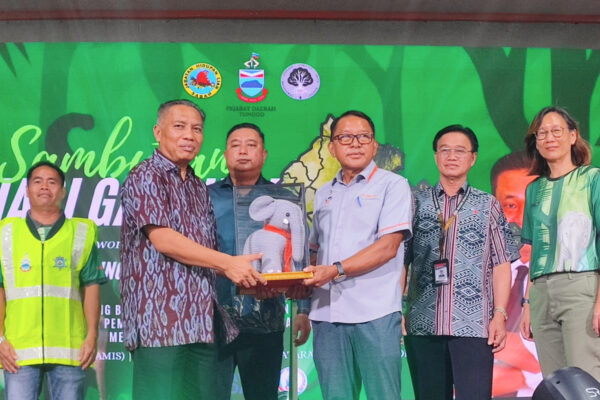Our Rurality programme is collaborating with Biopalma, Nestlé and Cargill to transform the lives of palm oil smallholders in the Amazon. Our new film showcases the work we are doing in the region.
Pará state, Brazil – Palm oil, when produced sustainably, can be a means to prevent further deforestation in the Brazilian Amazon. A new film, Farmers of the Forest, explores smallholders’ complex relationship with palm oil and the efforts being taken by Earthworm Foundation, its members Nestlé and Cargill, along with palm oil producer Biopalma, and its partner NORAD, to ensure palm oil production works for people and the environment.
Smallholders and palm oil
Palm oil is a vital source of income for thousands and their families in Pará. In turn, smallholders are integral to the palm oil supply as out of over 2000km2 of palm plantation, around 410km2 are farmed by small-scale farmers.
But pressure from agriculture is placing Pará’s forest at risk. Between August 2017 and May 2018, 2441km2 of forest were felled, nearly one-third of that figure was in Pará, according to the Institute of Man and Environment of the Amazon.
Agroecological zoning was put in place by the Brazilian Government when palm plantations were developed. This designated only previously degraded areas for palm oil expansion. Despite this, however, deforestation has continued to occur.
“At least some of this deforestation is being driven by smallholders,” explained John Van’t Slot, Earthworm Foundation’s Latin America Head. “Smallholders, for a variety of reasons, ‘clean their land’ of forest, to use the local phrase, in order to make it more productive financially.”
To find a balance that works between smallholders, businesses and the environment, Earthworm Foundation identified Pará as a key focal point for its work.
Initially, Cargill and Earthworm Foundation began an ART (Aggregator/ Refinery Transformation) Plan in the region. ART seeks to leverage the influence of refineries in order to engage directly with supplying mills within a specific area to create transformation at the landscape level. In Pará, the ART Plan brought all local mills supplying Cargill on board and resulted in them putting in place No Deforestation and No Exploitation Policies, backed up by action plans. In the course of developing the Plan, addressing smallholders’ issues was identified as a priority.
“By running both the ART Plan and Rurality, a programme designed to support small farmers improve their position in the supply chain and become more resilient, in the same area, the transformative power of both can be magnified, continued Van’t Slot.
The Rurality project is focussed on Biopalma’s supply chain and is centred around one mill that is supplied by 675 small-scale farmers.
Living in predominantly rural areas, the challenges these farmers face on a daily basis are varied. To get a deeper understanding of the local context, Rurality’s field staff, with support from Biopalma’s ground team, carried out what is called a Rural Dynamic Diagnostic in the area, interviewing 73 smallholders and 15 stakeholder groups.
“We found that smallholders generally have good productivity, with two-thirds meeting or exceeding their yield expectations,” explained Eric Batista, a Rurality Field Officer. “While that’s a good sign, we also found that the same smallholders face serious economic constraints, which undermine their profitability, and in turn, their livelihoods.”
The study found that 63 percent of smallholders had to refinance their loans, while 72 percent found it impossible to save enough in order to repay their loans. A lack of understanding of bank contracts and poor communication between the banks and farmers was also noted. This inability to pay back their loans has pushed some farmers to look for other sources of income, and in some cases, consider felling forest to increase the size of their farms, and in doing so, their profits.
“On top of that, we found smallholders mostly had limited knowledge of key areas that could improve their lives and make their business, their farm, truly profitable such as best farming practices, business management, or even health and safety measures,” Batista continued and added that the reasons are often due to a lack of technical assistance from state or private companies. Among the farmers interviewed by Rurality, 90 percent lacked such access. “This knowledge gap is a real challenge which farmers find difficult to overcome on their own.”
Resilient farmers, resilient farms
The ultimate goal of the project is to create conditions for smallholders to improve their connections with Biopalma and other institutions, develop their business and farm management, and increase their palm oil productivity, and, ultimately, their resilience. At the same time, these goals can’t come at the cost of more deforestation.
The challenges smallholders face also offer opportunities for transformation, that’s what underpins Rurality’s three-year action plan.
“Hooking farmers up with markets for their additional crops, whether that’s black pepper, manioc or fruit, could bring them more profits, while creating agroforestry systems could support their palm oil productivity in the long-run,” said Batista. Rurality has also identified lead farmers, who follow good practice on their farms, who will act as ambassadors to other farmers and share their knowledge and experience. “These are just a few of the options we’ll be looking at with Biopalma and its partner smallholders.”
"In the future, we hope that these farmers are empowered,” Batista concluded. “We hope they can take good care of their palm but also maintain other crops. We’ll be looking to collaborate with local partners and stakeholders to make this happen.”
By supporting smallholders to become resilient, Biopalma’s supply chain can be made more sustainable and this will bring simultaneous benefits not only to farmers, but to the whole region, protecting the precious Amazonian forest for years to come.


